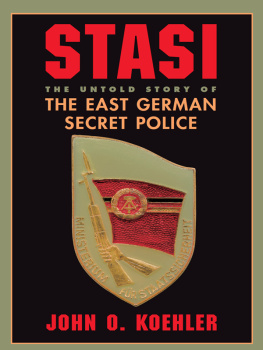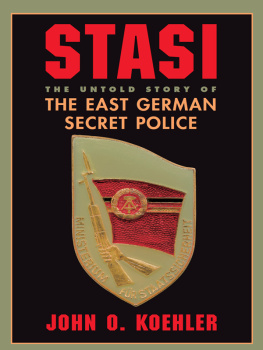Table of Contents
ACCLAIM FOR TIMOTHY GARTON ASHs
The File
Impeccable. Garton Ashs compassion for all those who live under totalitarian rule and are driven into moral contortions is admirable.
The New York Review of Books
As this century of murderous utopias draws to a close, we still understand remarkably little about what makes totalitarianism tick. From Alexander Solzhenitsyn to Primo Levi, it is the literary chroniclers who have done the job most persuasively. Timothy Garton Ash is one such chronicler.
The Wall Street Journal
[Garton Ashs] accounts of tracking down the enemies who betrayed him are riveting, but the names themselves dissolve into a deeply moving portrait of a state built on compromise and human weakness.
The New Yorker
Garton Ash can combine a journalists feel for the breaking story, for its drama and flow, with a historians sense of perspective. Genuinely provocative The File is always engaging.
Boston Globe
Riveting a moving book of simple, but uncommon virtues: erudition, clarity, honesty and humanity. An excellent piece of writing. This book will remind you of the beauty of freedomand of the value of courage and decency in what is all-too-often an unfree world.
Boston Globe
A kind of meditation on Garton Ashs personal experience with the Stasi, the dreaded secret police organ of the East German regime. No population was as closely watched for signs of dissidence, although Hoovers FBI came fairly close at times. The book is fascinating in its unearthing of some terribly human monster whose eye always recorded the fall of every sparrow.
Arthur Miller
The File reads almost like a spy thriller. Its prose is fluid, its pace fast, and its tone an appealing combination of the light and the serious.
Houston Chronicle
Crisp and compelling a thought-provoking glimpse of the Stasis all-too-human ambitions and weaknesses.
Baltimore Sun
In this painstaking, powerful unmasking of evil, the wretched face of tyranny is revealed.
Philadelphia Inquirer
Original, subtle and intriguing. Its easy to pass judgment from the safety of a democracy; can you or I be so sure that in a totalitarian state we would resist the shabby evil of reporting upon others if our job, the admittance of our children to school or universitythat is to say, our everyday kind of survivaldepended on it?
Nadine Gordimer
This book combines two genres: it is a political thriller, reminiscent of Graham Greene and John le Carr, and a treatise on memory, forgetting, and forgiving in the great tradition of Proust.
The New York Times Book Review
For
D., T. AND A.
A Note on Names
T HE FOLLOWING NAMES IN THE TEXT ARE PSEUDO nyms: Andrea, Claudia, Flash Harry, Frau Duncker and Frau R. Three informers are identified only by their Stasi aliases: Michaela, Schuldt and Smith. If anyone might be tempted to expose the real people behind these nameswhich in several cases would not be difficultI would ask for restraint from doing so, for reasons that should become clear.
G UTEN T AG, SAYS BUSTLING F RAU S CHULZ, YOU HAVE a very interesting file. And there it is, a buff-colored binder, some two inches thick, rubber-stamped on the front cover: OPK-Akte, Mfs, XV 2889/81 . Underneath is written, in a neat, clerical hand: Romeo.
Romeo?
Yes, that was your code name, says Frau Schulz, and giggles.
I SIT DOWN AT A SMALL PLASTIC-WOOD TABLE IN F RAU Schulzs cramped room in the Federal Authority for the Records of the State Security Service of the former German Democratic Republic: the ministry of the files. As I open the binder, I find myself thinking of an odd moment in my East German life.
One night in 1980, when I was living as a student in East Berlin, I came back with a girlfriend to my room in a crumbling Wilhelmine tenement house in the borough of Prenzlauer Berg. This was a room with a view: a view into it. Large French windows gave directly onto a balcony, and, were it not for the net curtains, people living across the street could look straight in.
As we embraced on the narrow bed, Andrea suddenly pulled away, finished undressing, went over to the window and threw open the net curtains. She turned on the glaring main light and then came back to me. Had this been, say, Oxford, I might have been a little surprised about the bright light and the open curtains. But this was Berlin, so I thought no more about it.
Until, that is, I learned about the Stasi file. Then I remembered this moment and started wondering whether Andrea had been working for the Stasi and whether she had opened the curtains so we could be photographed from the other side of the street.
Perhaps those photographs are now lurking in this binder, which Frau Schulz has already inspected. What was it she said? You have a very interesting file.
H ASTILY TURNING THE PAGES , I M RELIEVED TO FIND that there are no such photographs here and that Andrea does not appear as an informer. But there are other things that touch me.
Here, for example, is an observation report describing a visit I apparently paid to East Berlin on 06.10.79 from 16.07 hours to 23.55 hours. The alias given me by the Stasi at this date was, less romantically, 246816.
16.07 hours
246816 was taken up for observation after leaving the Bahnhof Friedrichstrasse frontier crossing. The person to be observed went to the newspaper stand in the upper station concourse and bought a Freie Welt, a Neues Deutschland and a Berliner Zeitung. Then the object [thats me] walked questingly around the station.
16.15 hours
in the upper station concourse 246816 greeted a female person with handshake and kiss on the cheek. This female person received the code name Beret. Beret carried a dark brown shoulder bag. Both left the station and went, conversing, to the Berliner Ensemble on Brechtplatz.
16.25 hours
both entered the restaurant
Ganymed
Berlin-Mitte
Am Schiffbauerdamm
After ca. 2 minutes the persons to be observed left the restaurant and went via Friedrichstrasse and Unter den Linden to the Operncaf.
16.52 hours
246816 and Beret entered the restaurant
Operncaf
Berlin-Mitte
Unter den Linden
They took seats in the caf and drank coffee.
18.45 hours
They left the caf and went to Bebelplatz. In the time from
18.45 hours
until
20.40 hours
They both watched with interest the torchlit procession to honor the 30th anniversary of the GDR. Thereafter 246816 and Beret went along the street Unter den Linden [and] Friedrichstrasse to the street Am Schiffbauerdamm.
21.10 hours
they entered there the restaurant Ganymed. In the restaurant they were not under observation.
23.50 hours
both left the gastronomic establishment and proceeded directly to the departure hall of the Bahnhof Friedrichstrasse frontier crossing, which they
23.55 hours
entered. Beret was passed on to Main Department VI for documentation. The surveillance was terminated.
Person-description of object 246816
| Sex: | male |
| Age: | 2025 years |
| Height: | ca. 1.75m |











